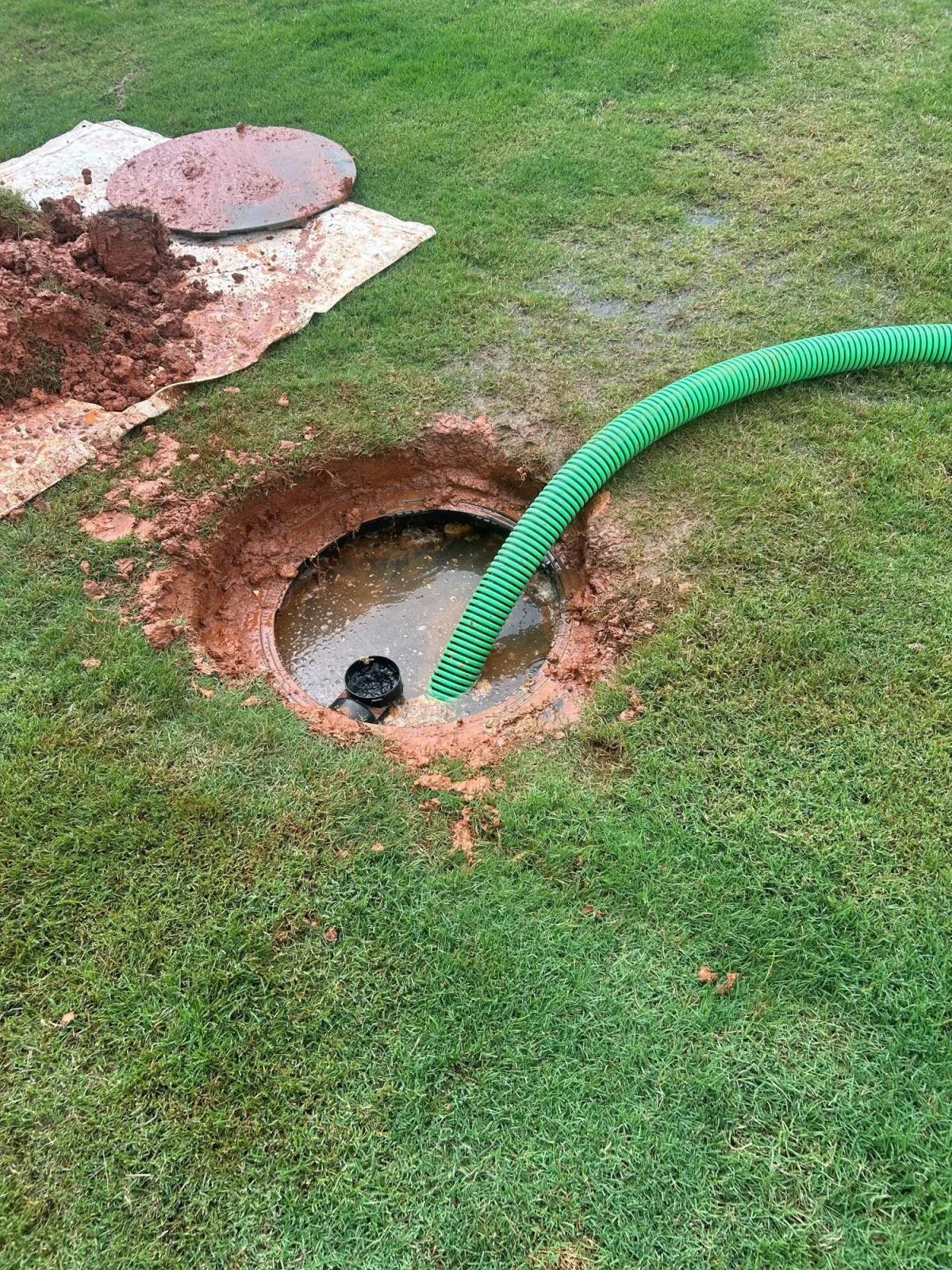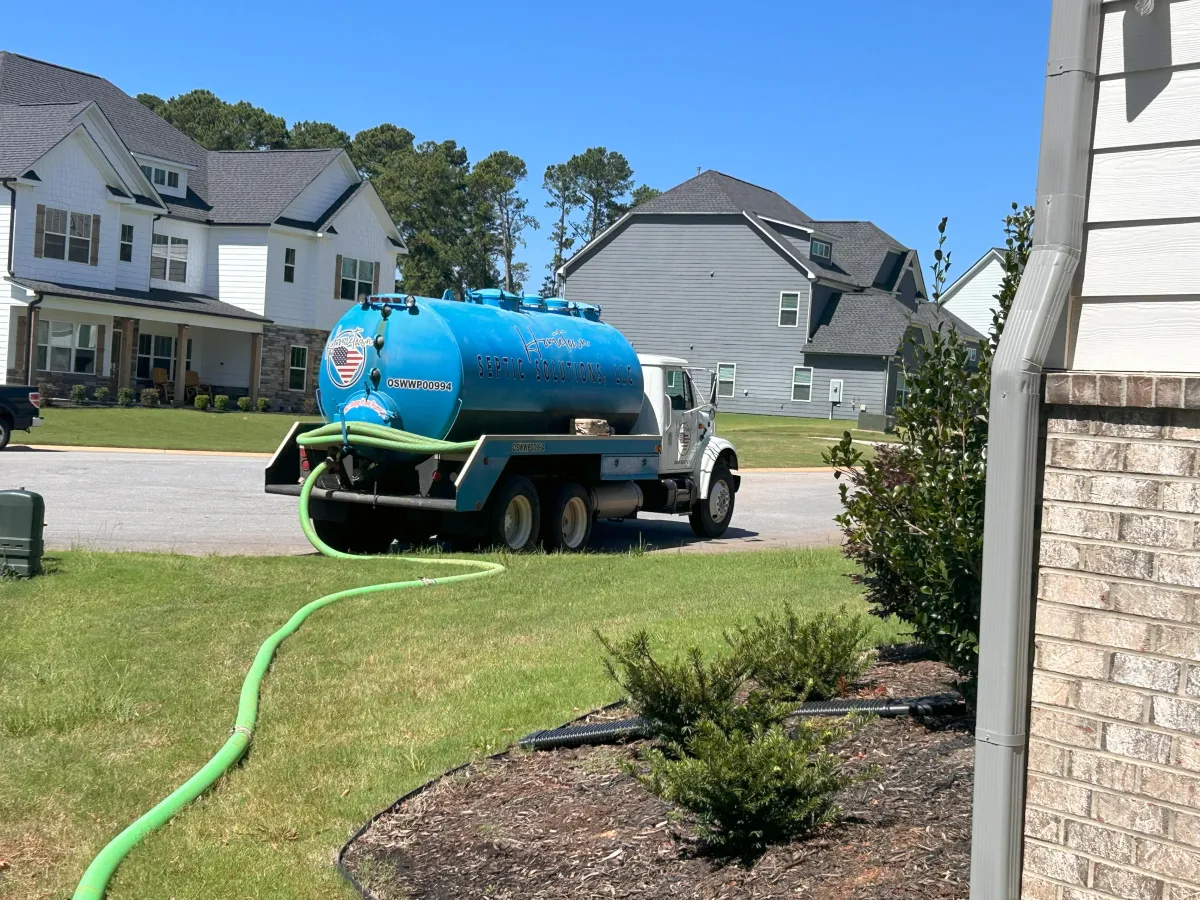Septic Pumping Near Anderson County, South Carolina
Hometown Septic Solutions LLC is Committed to superior quality and results!

AVOID COSTLY MISTAKES:
Do NOT hire an excavating contractor without first reading our free guide:
The ULTIMATE Excavation & Septic "Success Guide."

Signs Your Septic System Needs Pumping
Slow Drains in the Home
If sinks, tubs, or toilets are draining slowly, it may mean your septic tank is filling up and needs attention.
Foul Odors Around the Property
Strong sewage smells inside or outside your home often signal that the tank is overdue for pumping.
Pooling Water in the Yard
Standing water or soggy spots above the drain field are signs the system can’t process wastewater properly.
Sewage Backups
One of the most urgent red flags, backups into sinks, tubs, or toilets indicate the tank is beyond capacity.
Unusually Lush Grass Near the Drain Field
Greener, faster-growing patches of grass may mean wastewater is surfacing because the system is overloaded.
It’s Been More Than 3–5 Years
Even if no problems are obvious, most households need pumping every 3–5 years depending on tank size and water usage.
How Can We Help?


What Happens During a Septic Pumping Service near Anderson County, SC
Many homeowners don’t think about their septic system until there’s a problem. But by that point, the damage may already be done. Routine septic system pumping is the single best way to prevent sewage backups, foul odors, and costly system failures. Just like changing the oil in your car, pumping keeps your septic system working the way it was designed to.
At Hometown Septic Solutions, we recommend pairing septic pumping with thorough inspections. That way, you not only remove waste from your tank but also check for hidden problems before they grow. Our team in Anderson County, South Carolina, takes the time to explain what we find and give you peace of mind that your system is in good shape.
What Happens During a Septic Pumping Service
1. Locating and Preparing the Tank
When we arrive at your property in Anderson County, South Carolina, we begin by locating and uncovering the septic tank. This step ensures we have proper access to inspect and pump the system safely.
2. Pumping Out Waste Accumulation
We carefully remove the solids, scum, and liquid buildup inside the tank. This prevents clogs, protects the drain field, and reduces the risk of backups into your home.
3. Inspecting the Tank’s Interior
Once the tank is pumped, we check the interior walls for cracks, leaks, or structural damage. Identifying these problems early can prevent costly repairs or replacements.
4. Checking Baffles and Filters
Baffles and filters are vital for keeping solids from escaping into the drain field. We make sure they are in good condition and functioning as intended.
5. Personalized Pumping Schedule
Septic pumping isn’t the same for every household. Tank size, family size, and water usage all affect how often you should schedule service. We provide personalized guidance so you always know when your system needs attention.
6. Extending the Life of Your System
Regular septic pumping is one of the most effective ways to extend the life of your entire system. A well-maintained system can last for decades, while neglected systems often fail prematurely and require costly replacement
See Our Septic Services

✔️ Septic Services
✔️ Septic Inspections
✔️ Septic System Pumping
✔️ Septic Installations - Traditional Systems
✔️ Septic Repairs
✔️ Septic Tanks - Aerobic Systems
Quality Services Launched FAST!

✔️ Septic Tanks - Plastic/Poly
✔️ Septic Tanks - Concrete
✔️ Drain Field Replacement
✔️ Camera Inspections
✔️ Drainage Systems
What Are You Waiting For?
We Offer Septic Pumping Services near Anderson County, SC
Full Tank Pumping
Our team provides complete pumping services that remove all solids and liquid waste from your septic tank. We use the right equipment to get the job done efficiently and safely, ensuring your system gets a fresh start every time. With thousands of tanks pumped over the years, we know how to handle even the toughest jobs.
Preventive Maintenance with Septic Pumping
Pumping alone isn’t always enough. That’s why we pair septic system pumping near Anderson County, South Carolina, with detailed inspections. We look for early warning signs of trouble, such as cracks, leaks, or baffle damage, so you can take action before problems escalate. This proactive approach saves you time, money, and stress.
Emergency Septic Pumping
Septic backups don’t wait for a convenient time. When you’re dealing with sewage in your home, soggy spots in the yard, or overwhelming odors, you need immediate help. That’s why Hometown Septic Solutions offers 24/7 emergency septic pumping across Anderson County. We respond quickly, get your system cleared, and help prevent further damage.
Customized Pumping Schedules
Every property is different, and so is every septic system. A household of two may only need pumping every five years, while a large family might require it every two to three. We work with you to determine the best schedule for your situation, so you never risk overfilling your tank. Our goal is to give you clarity and peace of mind.
Real Estate Septic Pumping Services
If you’re buying or selling a home in Anderson County, a septic pumping are critical. For buyers, it confirms the system is safe and functional. For sellers, it prevents last-minute issues that could derail a sale. Our real estate septic pumping services provide documentation and confidence for all parties involved.
Long-Term System Protection
Septic pumping isn’t just a chore it’s an investment in the long-term health of your system. Regular service prevents costly failures, extends the lifespan of your drain field, and keeps your home safe from contamination. At Hometown Septic Solutions, we see pumping as more than maintenance; it’s the key to protecting your property for years to come.
Our septic pumping services are about more than just emptying tanks, they’re about protecting your home, your property, and your family’s health. From routine maintenance to emergency response, we deliver dependable solutions tailored to the needs of homeowners in Anderson County, South Carolina. With years of experience and thousands of tanks pumped, we understand what it takes to keep septic systems running smoothly. When you’re ready for reliable service that puts your peace of mind first, contact us today to schedule your septic pumping service and keep your system in top condition.
Hours: 7am - 6pm Mon - Sat
Available for 24/7 Emergency Services
Address: 17711 Highway 101 S, Gray Court, South Carolina, 29645
All rights reserved | Client Support Area

